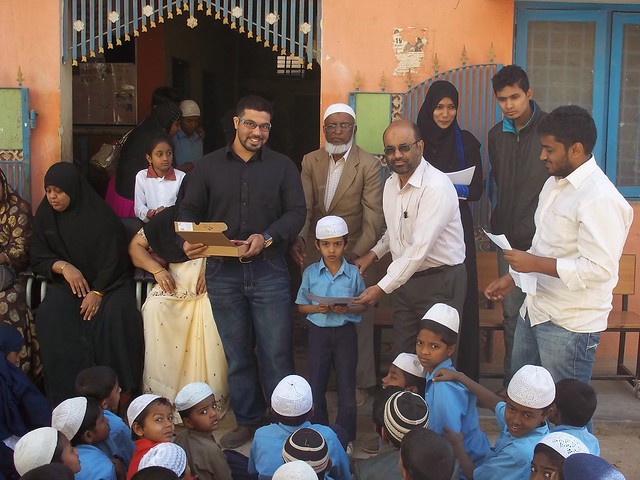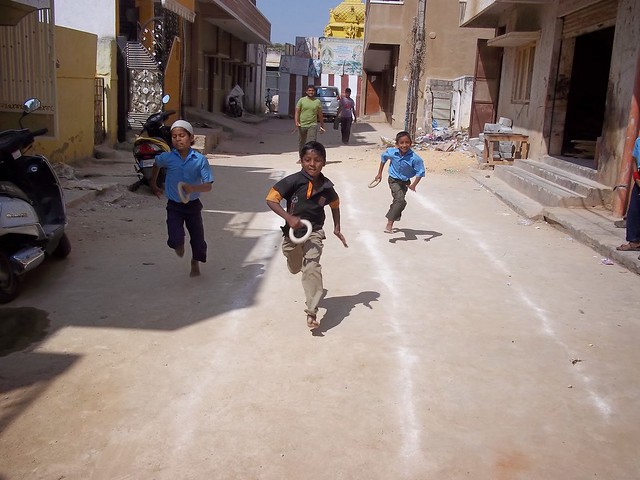By Shaik Zakeer Hussain, TwoCircles.net,
Bengaluru: It is a bright Sunday morning. In the decrepit surroundings of Siddiqya Government Urdu School in Gandhi Nagar area, students are busy with their favourite activity of the week – physical education (PE). “Because of the background and the environment that the children come from, PE for them simply meant wrestling (WWE) or Rock and Stone Cold. That had to change. Discipline, decorum and conduct, essential for PE class, was to be instilled here. That was the challenge,” said a volunteer.
The efforts seem to have paid off over the week. After warming exercises – cross jumping, bend-downs and shoulder freeing rotation et al – the students choose kabaddi and kho kho. Sometimes it is foot ball or volley ball. And sometimes, turning the narrow lanes of the neighbourhood into makeshift athletics tracks, it is racing. All conducted by volunteers of ALIF.

ALIF is a group of volunteers teaching in schools such as Siddiqya during their weekends. These schools are such where inadequate infrastructure and apathy of both teachers and parents has culminated into a miserable educational condition for its students.
PE is just one of the core areas that volunteers are involved in. The ALIF volunteers felt most schools such as Siddiqya need physical education, moral education, computer knowledge/education and English education.
On another morning, students clad in their uniforms listen attentively to Abdul Muqeet Khan. Muqeet’s class is about repentance (part of moral education). The 25-year-old engineer, who works for the technology giant IBM, explains – in a language easy to understand for children: “When you cheat someone, you betray yourself first before betraying others. And the only way out is to repent.”
He then lists downs a simple step by step course of action. The first is realization – to know what you have done, the second is to repent – feel it is indeed something wrong, third is to promise oneself never to commit the same mistake again and the last is to say sorry to the person who you have hurt.
Morally overboard as it may seem at the peripheral, surprisingly, the lesson seems to have worked for the students. They turn to each other and say sorry with an infectious smile.

First aid class
A humble beginning turned into success story
Started in 2013 by Research and Development (R&D) engineer Jasir Abdul Qadir and Farooq Baseeth, the self defined purpose of ALIF is to, “identify the schools in need of immediate help, then to assess their under-resourced requirements and help them in getting rid of these shortages such as providing the students with physical education, moral education, computers and English language skills.”
Jasir says most government schools, especially Urdu medium schools, need urgent assistance in form of tutors or young volunteers, from educated backgrounds to spare 2-3 hours during their weekend (mornings) to help the students and teachers in activities which the school is under-staffed in.
He says vast numbers of these children cannot read, write or perform basic arithmetic. And due to shortage of and longstanding neglect of teachers, the matter just worsens. “That’s where an initiative like ALIF comes into picture,” says Shuaib Ahmed, one of the volunteers, and son of Siddiqya’s principle, who joined the group, seeing its role in changing the lives of these children.
According to a 2011 survey conducted by city’s Akshara Foundation, nearly 17% of Urdu-speaking children in Bangalore study in some 171 government-run Urdu schools. While Urdu helps students retain touch with their mother tongue, however, it ill-equips the children to face the current day realities. In fact, many Urdu medium government schools do not operate classes beyond 7th grade. As a result, parents are compelled to send their wards to English medium schools. Students find it extremely difficult to adapt to a new language and give up in the process.
So, ALIF focuses on computer and English language skills and moral education, which according to them is of critical importance. While the importance of English language is apparent, however, when asked why a volunteer group, such as his, is interested in imbibing moral education, Jasir decoded the social fissures existing in areas where schools such as Siddiqya and others exist.
“When we first adopted the school, and started volunteering, we assumed that teaching English and computers would empower these students to take up higher education and jobs. But we soon realized that was just not the case,” he says.
The residents of these surrounding areas are economically and socially backward. Many of them are daily wage earners living in shanties or asbestos covered houses. According to him, they are vulnerable to drug abuse, alcoholism and even prostitution. There are many vested interests operating here, who thrive on the susceptibility of others, often in connivance with the authorities.
“Many of these children drop out, either because of the lackadaisical attitude of their parents or because they get lured by other older drop outs, many of whom are addicted to drugs and other substance,” says Nazeer Ahmed, the elderly hand supporting ALIF. These moral lessons, he says, help students “develop a righteous character, in an otherwise decadent environment.”

Sports
Since its inception a year ago, ALIF today has three schools under its wing, with 12 active volunteers.
ALIF’s involvement does not end with equipping children with language skills. Jasir says they also counsel parents to send their wards to school regularly, who seem to be indifferent to their child’s learning and only see them as additional hands for work. And they also try keeping students away from preying eyes.
The group also provides feedback and assistance to teachers in understanding what students need. “This, we feel is a requirement so teachers feel partnered with ALIF. For us, providing the opportunity for education is to empower these children to a great future,” adds Baseeth.
———
(To be a part of ALIF, contact them via their Facebook page: https://www.facebook.com/alifeducation or visit their blog: http://educatewithalif.blogspot.in/ )
For more TCNPositive story

